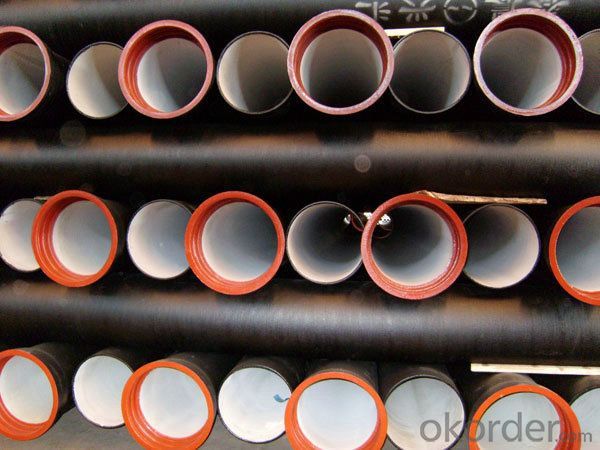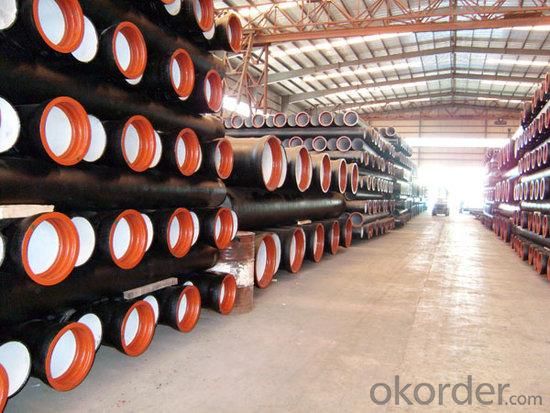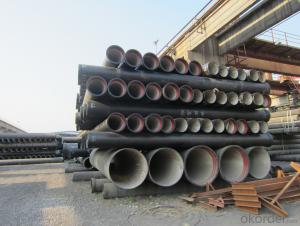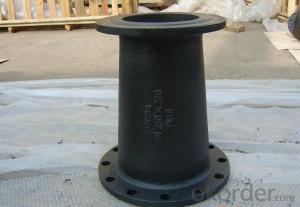Ductile Iron Pipe of China DN400 EN545/EN598/ISO2531 for Water Supply
- Loading Port:
- China main port
- Payment Terms:
- TT or LC
- Min Order Qty:
- 20 m.t.
- Supply Capability:
- 100000 m.t./month
OKorder Service Pledge
OKorder Financial Service
You Might Also Like
1,Ductile Iron Pipe Description :
1) Pipes confirm to ISO2531,K9 class,T type joint,6m long,with inside cements lining conform to ISO4179, outside Zinc spraying(130g/m2) and bitumen coating(70μm) conform to ISO8179.
2) Pipe ends: Spigot and socket ends, with 100% SBR rubber gaskets accoding to ISO4633
3) we can do third party inspection according to customer's request.
4) Our products have been sold to many international market, such as Middle East and South East Asia and Africa.
2,Main Features of the Ductile Iron Pipe:
•High yield strength
•High tensile Strength
•High corrosion resistance
•Pressure Resistence
•Anti-corrosion
•Installation is convenient
•Satisfy the highest hygienic standards
1. Material: Ductile iron grade 500-7/ 450-10 in accordance with ISO1083
2. Standard: ISO 2531, EN545, EN598, ANSI, AWWA
3. Certificate: ISO9001, ISO14001, SGS, NSF, WRAS
4. Test: In accordance with ISO 2531 / EN 545 / EN598 and 100% water pressure test
5. Length: 6m or cut into 5.6m, 5.7m, 5.8m
6. Internal Lining: Cement, conform to ISO4179
7. External coating: Zinc + Bitumen, conform to ISO8179
3,Ductile Iron Pipe Images:


4. Ductile Iron Pipe Specification
Place of Origin: China (Mainland)
Model Number: DN80-1600
Length: 6M/5.7M/NEGOTIATED
Standard: ISO2531 / EN545
Application: Potable/Sewage Water
Diameter: DN80-1600
Shape: Round
Hardness: 230
Pipe Wall Thickness: standerd
Pull Strength: 420
Yield (≥ MPa): 300
Material: Ductile Iron
water ductile iron pipe: SO2531 / EN545 DI pipe
5.FAQ:
We have organized several common questions for our clients,may help you sincerely:
1.Q: Why would you choose ductile iron pipe rather than other pipe materials?
A:The reasons are obvious for that not only ductile iron pipe possesses the inherent strength and flexibility of ductile iron, combined with proven corrosion protection systems, but also the cost savings can be achieved from design to installation and commissioning.
2.Q:Why can you guarantee the inner of pipes can’t be corroded?
A: High alumina cement mortar lining and sulphate-resistant cement mortar lining. These two special linings are applicable to inner anti-corrosion for sewage pipes, improving resistance to erosion of the sewage components.
- Q:Do ductile iron pipes have inner enamel?
- For fire water and living water supply, low requirement is lined with cement mortar, some high can be lined with epoxy resin, epoxy ceramic lining, as well as cement mortar lining epoxy sealing layer (compromise is the price of blame).
- Q:What is the internal lining used in ductile iron pipes?
- The internal lining used in ductile iron pipes is typically a cement mortar lining.
- Q:How does ductile iron pipe perform in high-velocity flow conditions?
- Ductile iron pipe performs exceptionally well in high-velocity flow conditions. Due to its unique properties, including high tensile strength and impact resistance, ductile iron pipe can withstand the forces exerted by high-velocity flows without experiencing significant damage or failure. One of the key advantages of ductile iron pipe is its ability to resist the effects of water hammer, which is a sudden increase in pressure caused by the rapid deceleration or change in direction of water flow. This is particularly important in high-velocity flow conditions where the velocity of water is significantly higher than normal. Ductile iron pipes are designed to absorb and dissipate the energy generated by water hammer, preventing potential damage to the pipe and the surrounding infrastructure. Additionally, ductile iron pipe has excellent flow characteristics, allowing for smooth and efficient water transport even at high velocities. This is crucial in applications where a large volume of water needs to be transported quickly, such as in industrial processes or fire protection systems. The smooth interior surface of ductile iron pipe minimizes friction and pressure losses, ensuring that the water can flow freely and efficiently, reducing energy consumption and operating costs. Moreover, ductile iron pipe is highly resistant to corrosion, which is a common issue in high-velocity flow conditions where the water may contain aggressive chemicals or particulates. The protective lining and coating systems used in ductile iron pipes provide a barrier against corrosion, extending the lifespan of the pipe and maintaining its structural integrity. In summary, ductile iron pipe is well-suited for high-velocity flow conditions due to its ability to withstand water hammer, its excellent flow characteristics, and its resistance to corrosion. Its strength, durability, and reliable performance make it a preferred choice for various applications, ensuring efficient water transport even in demanding environments.
- Q:What are the differences between ductile cast iron pipes and centrifugal ductile iron pipes?
- Centrifugal casting is a casting method. Ball milling cast iron pipe is a kind of material.
- Q:Can ductile iron pipe be used for trenchless installation methods?
- Yes, ductile iron pipe can be used for trenchless installation methods. Trenchless installation methods, such as horizontal directional drilling (HDD) or pipe bursting, are techniques used to install underground utilities with minimal excavation and disruption to the surrounding environment. Ductile iron pipe is well-suited for these methods due to its inherent strength, durability, and flexibility. It can withstand the forces and stress associated with trenchless installation, including the pulling forces during HDD or the bursting forces during pipe bursting. Additionally, ductile iron pipe's corrosion resistance makes it suitable for applications where the pipe is installed underground without the need for protective coatings. Therefore, ductile iron pipe is a reliable choice for trenchless installation methods.
- Q:Are ductile iron pipes suitable for use in cooling water systems?
- Yes, ductile iron pipes are suitable for use in cooling water systems. They offer excellent strength, durability, and corrosion resistance, making them ideal for transporting water at varying temperatures. Additionally, their flexibility allows them to withstand pressure and temperature changes, ensuring long-lasting and reliable performance in cooling water applications.
- Q:How do ductile iron pipes handle thermal expansion and contraction?
- Ductile iron pipes are specifically designed to handle thermal expansion and contraction effectively. Due to their unique composition and structure, which includes graphite nodules in the iron matrix, these pipes have the ability to accommodate temperature variations without significant damage or distortion. The graphite nodules act as flexible joints, allowing the pipe to expand and contract without cracking or breaking. This characteristic makes ductile iron pipes highly resistant to the stresses caused by thermal fluctuations, ensuring their long-term durability in various temperature environments.
- Q:Method for joining cast iron pipes
- The connection between the pipe and the pipe adopts the form of socket type or flange disk interface. According to the function, it can be divided into two kinds: flexible interface and rigid interface. The flexible interface is sealed with rubber ring, which allows a certain degree of corner and displacement, so it has good seismic resistance and tightness. It is easy and quick to install than rigid interface. It has little labor intensity according to the casting method.
- Q:How do ductile iron pipes handle soil erosion?
- Ductile iron pipes are highly resistant to soil erosion due to their robust construction and inherent strength. The pipes' durable and flexible nature allows them to withstand the impact of soil movement and erosion without significant damage. Moreover, the corrosion-resistant coatings applied to ductile iron pipes further enhance their ability to resist erosion caused by soil particles and other corrosive elements. Overall, ductile iron pipes provide a reliable and long-lasting solution for handling soil erosion in various applications.
- Q:How do ductile iron pipes perform in high-altitude areas?
- Due to their inherent strength and durability, ductile iron pipes are highly effective in high-altitude regions. The exceptional properties of ductile iron, such as its high tensile strength and impact resistance, make it ideal for withstanding the challenges presented by high-altitude environments. One significant advantage of ductile iron pipes is their ability to endure both internal and external pressures. In areas with varying water pressure, these pipes can withstand such fluctuations without compromising their structural integrity. This guarantees a consistent and uninterrupted flow of water, eliminating the risk of pipe failures or leaks. Furthermore, ductile iron pipes possess excellent resistance against corrosion, which is crucial in high-altitude areas with unpredictable and harsh atmospheric conditions. The protective lining and external coatings of these pipes provide an additional layer of defense, ensuring their durability and reducing the need for frequent maintenance or replacements. Additionally, ductile iron pipes have a higher tolerance for temperature variations compared to other materials. In high-altitude regions where temperature fluctuations can be extreme, these pipes can withstand expansion and contraction without cracking or rupturing. This thermal stability is vital for maintaining the integrity of the pipeline system and preventing costly repairs. To summarize, ductile iron pipes are an ideal choice for high-altitude areas due to their strength, durability, resistance to pressure variations, corrosion resistance, and thermal stability. These properties make them a reliable option for water distribution systems in such environments, ensuring a continuous water supply without compromising safety or efficiency.
1. Manufacturer Overview |
|
|---|---|
| Location | |
| Year Established | |
| Annual Output Value | |
| Main Markets | |
| Company Certifications | |
2. Manufacturer Certificates |
|
|---|---|
| a) Certification Name | |
| Range | |
| Reference | |
| Validity Period | |
3. Manufacturer Capability |
|
|---|---|
| a)Trade Capacity | |
| Nearest Port | |
| Export Percentage | |
| No.of Employees in Trade Department | |
| Language Spoken: | |
| b)Factory Information | |
| Factory Size: | |
| No. of Production Lines | |
| Contract Manufacturing | |
| Product Price Range | |
Send your message to us
Ductile Iron Pipe of China DN400 EN545/EN598/ISO2531 for Water Supply
- Loading Port:
- China main port
- Payment Terms:
- TT or LC
- Min Order Qty:
- 20 m.t.
- Supply Capability:
- 100000 m.t./month
OKorder Service Pledge
OKorder Financial Service
Similar products
New products
Hot products
Hot Searches
Related keywords


























